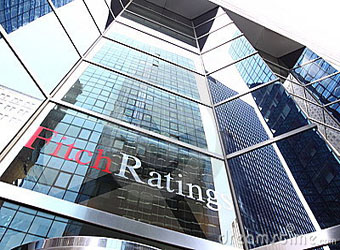Fitch Ratings has affirmed National Bank of Egypt’s (NBE), its wholly-owned subsidiary, National Bank of Egypt (UK) Ltd’s (NBEUK), and Commercial International Bank’s (CIB) Long-term foreign currency Issuer Default Ratings (IDR) at ‘B-‘ and revised the Outlooks to Stable from Negative.
The Outlook revision on NBE, NBEUK and CIB reflect the rating action taken on the Arab Republic of Egypt’s ratings (see ‘Fitch Revises Egypt’s Outlook to Stable; Affirms at ‘B-” dated 3 January 2014 at www.fitchratings.com).
NBE’s and CIB’s Viability Ratings (VR), which are highly linked to the sovereign’s ratings, have also been affirmed at ‘b-‘ and ‘b’, respectively. Credit Agricole Egypt’s (CAE) Support Rating, which is also linked to the sovereign’s ratings, has been affirmed at ‘4’.
NBE’s, CIB’s and CAE’s National Ratings have been affirmed as Fitch considers that their relative creditworthiness remains unchanged.
A full list of rating actions is at the end of this release.
KEY RATING DRIVERS – IDRs, SUPPORT RATINGS AND SUPPORT RATING FLOORS
NBE’s Long-term and Short-term IDRs are equalised with Egypt’s Long-term foreign currency IDRs, with the Egyptian authorities’ strong propensity to support the bank constrained by the limitations on their ability to do so (as indicated by Egypt’s ‘B-‘ rating).
NBE is wholly owned by the Egyptian state. It is Egypt’s largest bank by assets, with a dominant domestic franchise, especially in customer deposits.
NBEUK’s IDRs are in line with its parent’s IDRs and, in turn, Egypt’s Long-term foreign currency IDRs. They reflect Fitch’s view that there is a limited probability of support from the Egyptian state via NBE.
CIB’s Long-term IDR is driven by its VR but is constrained by Egypt’s Country Ceiling of ‘B-‘. CIB is the leading private sector bank in Egypt.
CAE’s Support Rating reflects Fitch’s belief that Credit Agricole (A/Stable) has a high propensity to support its Egyptian subsidiary, but that this likelihood of support is constrained by the Egyptian sovereign ratings. CAE is about 60% owned by Credit Agricole and is part of Credit Agricole’s presence and strategy in the Middle East and North Africa region.
RATING SENSITIVITIES – IDRs, SUPPORT RATINGS AND SUPPORT RATING FLOORS
The ratings are sensitive to the Egyptian sovereign ratings, and any changes would reflect a change in the sovereign ratings.
CAE’s Support Rating is also sensitive to any change in Credit Agricole’s propensity or ability to provide support.
KEY RATING DRIVERS – NATIONAL RATINGS
NBE’s, CIB’s and CAE’s National Ratings reflect their relative ranking in the market for local currency risk.
RATING SENSITIVITIES – NATIONAL RATINGS
The ratings are sensitive to any change in Fitch’s view of the relative ranking of the banks, which could arise as a result of their being affected to differing degrees by developments (positive or negative) in the market. The Outlooks on the National Ratings are Stable, reflecting Fitch’s expectation that the relative ranking of the three banks will remain stable.
KEY RATING DRIVERS – VR
NBE’s VR reflects the close ties between its creditworthiness and that of the Egyptian sovereign, including through substantial holding of government debt. Given that virtually all of NBE UK’s funding and its main business are dependent on its connection to the Egyptian sovereign, through NBE, and NBEUK’s strategy capitalises on NBE’s franchise, Fitch has not assigned a VR to NBEUK.
CIB’s VR is effectively capped by its high exposure to the domestic economic environment and significant holdings of Egyptian sovereign debt. However the VR takes into account the strength of the bank’s local franchise and experienced management, its consistently strong profitability, sound asset quality and liquidity. The VR remains above its foreign currency IDR as Fitch considers that, despite the difficult conditions in the domestic market, CIB’s intrinsic creditworthiness remains among the strongest in the sector.
RATING SENSITIVITIES – VR
The banks’ VRs are sensitive to developments in the domestic operating environment which would impact performance, asset quality, and/or capitalisation. An improvement in the operating environment could result in upward pressure on the VRs.
In addition, CIB’s VR – being the highest among rated banks in Egypt and above the foreign currency IDR – could be vulnerable to downward pressure if the bank’s exposure to the Egyptian sovereign were to increase significantly.
The rating actions are as follows:
NBE
Long-term IDR affirmed ‘B-‘; Outlook revised to Stable
Short-term IDR affirmed at ‘B’
National Long-term Rating affirmed ‘AA-(egy)’; Outlook Stable
National Short-term Rating affirmed at ‘F1+(egy)’
Viability Rating affirmed at ‘b-‘
Support Rating affirmed at ‘5’
Support Rating Floor affirmed at ‘B-‘
Senior unsecured debt affirmed at ‘B-‘
NBEUK
Long-term IDR affirmed ‘B-‘; Outlook revised to Stable
Short-term IDR affirmed at ‘B’
Support Rating affirmed at ‘5’
CIB
Long-term IDR affirmed ‘B-‘; Outlook revised to Stable
Short-term IDR affirmed at ‘B’
National Long-term Rating affirmed at ‘AA(egy)’; Outlook Stable
National Short-term Rating affirmed at ‘F1+(egy)’
Viability Rating affirmed at ‘b’
Support Rating affirmed at ‘5’
Support Rating Floor affirmed at ‘B-‘
CAE
National Long-term Rating affirmed at ‘AA+(egy)’; Outlook Stable
National Short-term Rating affirmed at ‘F1+(egy)’
Support Rating affirmed at ‘4’
Fitch Revises Two Egyptian Banks’ Outlooks to Stable; Affirms at ‘B-‘


